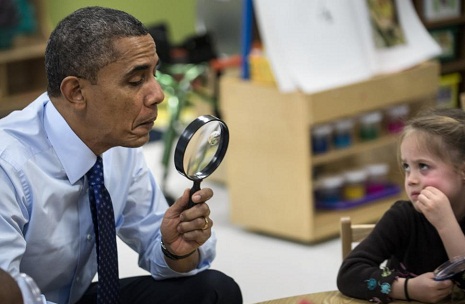Politics this week

A Florida doctor, Salomon Melgen, was indicted for defrauding Medicare, the government health scheme for the old, which he had billed for $105m over six years. Earlier this month Mr Melgen and Senator Bob Menendez, a New Jersey Democrat, were indicted for trading gifts for favours. Both men deny wrongdoing. The sidelining of Mr Menendez, a foreign-policy hawk, made discussions between Barack Obama and Congress over Iran a bit easier.
Five more glorious years
Sudan held a presidential election and, though the results will not be announced until April 27th, most believe President Omar Hassan al-Bashir is sure of another term in office. Opposition groups boycotted the poll. Sudan is war-ravaged and its economy is struggling. But Mr Bashir, indicted for genocide by the International Criminal Court, has never looked stronger.
Russia has lifted a self-imposed ban on the sale to Iran of an advanced air-defence system, a move criticised by the countries involved in talks to limit Tehran’s nuclear programme. America and Israel opposed selling the S-300 system to Iran on the grounds that it would make any air strikes on its nuclear facilities harder and upset the region’s balance of military power.
The Shabab, al-Qaeda’s affiliate in Somalia, exploded a car bomb outside the Ministry of Higher Education in Mogadishu, the capital. At least 19 people were killed, including seven attackers. It comes on the heels of the Shabab’s massacre at a university in Garissa, Kenya, in which gunmen killed 148 people.
Three weeks of air strikes by a Saudi-led coalition have done little to halt the advance of the Iranian-backed Houthi rebels in Yemen. Pakistan has affirmed that it will not send in ground troops. Muhammad Javad Zarif, Iran’s foreign minister, has laid out a four-point plan to resolve the crisis.
Yemen’s civil war has benefited al-Qaeda in the Arabian Peninsula, the group’s most dangerous branch, which has taken over Mukalla, a Yemeni port. But an American drone strike killed Ibrahim al-Rubeish, a top figure in the outfit.
Lights out
A court in Japan blocked the reopening of a nuclear power plant in Fukui on the main island’s west coast. The Takahama plant had already obtained approval from Japan’s nuclear regulator. It is a blow to Shinzo Abe, the prime minister. Nuclear power generated 30% of Japan’s electricity before the Fukushima Dai-ichi nuclear disaster, after which the country’s nuclear power stations were shut down.
The government in China released five feminist activists detained for planning protests against sexual harassment on public transport on March 8th, International Women’s Day. They may still be prosecuted for supposedly creating a disturbance.
In response to protests in Hong Kong against mainland Chinese who buy goods in bulk to resell, China limited residents of Shenzhen, across the border from Hong Kong, to visiting the territory just once a week. Goods in Hong Kong are cheaper and more trusted, but a surge of mainland Chinese visitors has bred resentments.
India relaxed the last of the restrictions on the production of goods, including pickles and chutneys, that are “reserved” exclusively for small businesses. At the peak of industrial policy in the 1970s some 800 goods were similarly reserved.
Hill start
The British election creaked into third gear with the launch of the parties’ manifestos. With the polls still too tight to call, the Conservatives promised more free child care and subsidies for social-housing tenants. Labour vowed to avoid further borrowing and keep cutting the deficit.
Good weather encouraged more boatloads of would-be migrants across the Mediterranean. The Italian coastguard rescued hundreds, but as many as 400 were feared drowned after one boat capsized off Libya. The UN said not enough was being done to save lives
The extreme-right Jobbik party shocked Hungary’s ruling right-wing Fidesz party by winning a by-election. Jobbik claims that it, not the left, is now the only plausible opposition to the Fidesz prime minister, Viktor Orban.
Turkey attacked Pope Francis and the European Parliament after both described the Ottoman massacres of Armenians in 1915-16 as genocide. Turkish objections to the word have intensified in the run-up to the centenary of the start of the killings on April 24th.
Despite a purported ceasefire, renewed violence broke out in eastern Ukraine. Ukraine said six of its soldiers had been killed; pro-Russian rebels said one of their fighters had died.
Historic handshake
Barack Obama and Raúl Castro held the first substantive meeting between the leaders of the United States and Cuba in nearly 60 years at a summit in Panama. Mr Castro railed against the embargo that the United States imposed on Cuba, which was loosened last December, but called Mr Obama an “honest man”. After the summit the United States removed Cuba from its list of state sponsors of terrorism. The decision eliminates an obstacle to restoring diplomatic relations.
FARC guerrillas killed at least ten Colombian soldiers and wounded 17 more. The army claimed that the FARC initiated the attacks. That would make it the most serious breach yet of a ceasefire declared by the rebel group in December. Colombia’s president, Juan Manuel Santos, ordered a resumption of air raids on the FARC, which he had suspended in March. The two sides have been holding talks aimed at ending the 50-year conflict.
Eduardo Galeano, a radical Uruguayan writer, has died, aged 74. He is most famous for “Open Veins of Latin America”, which blamed the region’s problems on European colonisers and the United States. Late in life he said that the book belonged to “a past era”.















































